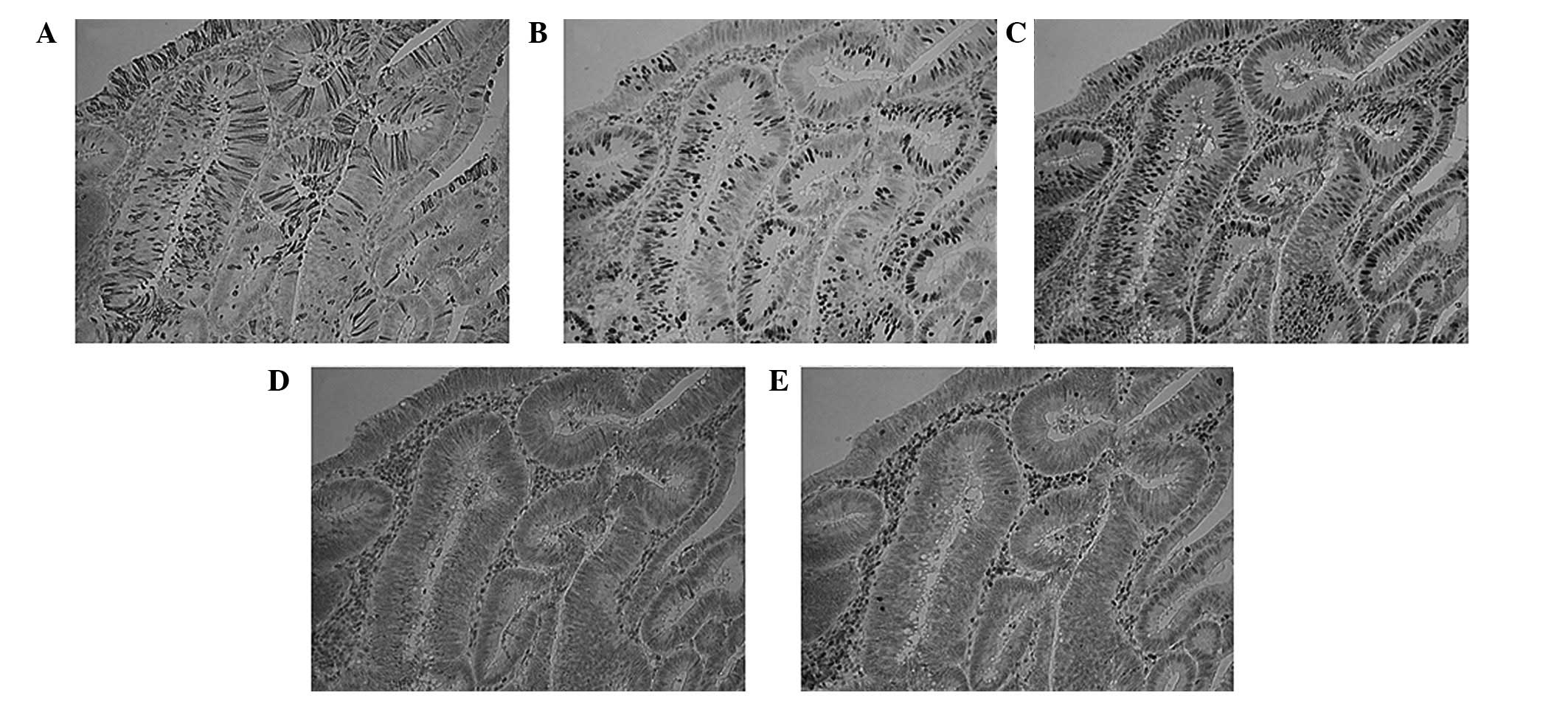|
1.
|
Sauer R, Becker H, Hohenberger W, et al:
Preoperative versus postoperative chemoradiotherapy for rectal
cancer. N Engl J Med. 351:1731–1740. 2004. View Article : Google Scholar : PubMed/NCBI
|
|
2.
|
van den Brink M, Stiggelbout AM, van den
Hout WB, et al: Clinical nature and prognosis of locally recurrent
rectal cancer after total mesorectal excision with or without
preoperative radiotherapy. J Clin Oncol. 22:3958–3964.
2004.PubMed/NCBI
|
|
3.
|
Guillem JG, Chessin DB, Cohen AM, et al:
Long-term oncologic outcome following preoperative combined
modality therapy and total mesorectal excision of locally advanced
rectal cancer. Ann Surg. 241:829–838. 2005. View Article : Google Scholar
|
|
4.
|
Smith FM, Reynolds JV, Miller N, et al:
Pathological and molecular predictors of the response of rectal
cancer to neoadjuvant radiochemotherapy. Eur J Surg Oncol.
32:55–64. 2006. View Article : Google Scholar : PubMed/NCBI
|
|
5.
|
Bertolini F, Bengala C, Losi L, et al:
Prognostic and predictive value of baseline and posttreatment
molecular marker expression in locally advanced rectal cancer
treated with neoadjuvant chemoradiotherapy. Int J Radiat Oncol Biol
Phys. 68:1455–1461. 2007. View Article : Google Scholar
|
|
6.
|
Rodel C, Martus P, Papadoupolos T, et al:
Prognostic significance of tumor regression after preoperative
chemoradiotherapy for rectal cancer. J Clin Oncol. 23:8688–8696.
2005. View Article : Google Scholar : PubMed/NCBI
|
|
7.
|
Bujko K, Michalski W, Kepka L, et al:
Association between pathologic response in metastatic lymph nodes
after preoperative chemoradiotherapy and risk of distant metastases
in rectal cancer: an analysis of outcomes in a randomized trial.
Int J Radiat Oncol Biol Phys. 67:369–377. 2007. View Article : Google Scholar
|
|
8.
|
Dhadda AS, Dickinson P, Zaitoun AM, et al:
Prognostic importance of Mandard tumour regression grade following
pre-operative chemo/radiotherapy for locally advanced rectal
cancer. Eur J Cancer. 47:1138–1145. 2011. View Article : Google Scholar : PubMed/NCBI
|
|
9.
|
Topova L, Hellmich G, Puffer E, et al:
Prognostic value of tumor response to neoadjuvant therapy in rectal
carcinoma. Dis Colon Rectum. 54:401–411. 2011. View Article : Google Scholar : PubMed/NCBI
|
|
10.
|
Tannapfel A, Nusslein S, Fietkau R, et al:
Apoptosis, proliferation, bax, bcl-2 and p53 status prior to and
after preoperative radiochemotherapy for locally advanced rectal
cancer. Int J Radiat Oncol Biol Phys. 41:585–591. 1998. View Article : Google Scholar : PubMed/NCBI
|
|
11.
|
Rupa JD, de Bruine AP, Gerbers AJ, et al:
Simultaneous detection of apoptosis and proliferation in colorectal
carcinoma by multiparameter flow cytometry allows separation of
high and low-turnover tumors with distinct clinical outcome.
Cancer. 97:2404–2411. 2003. View Article : Google Scholar : PubMed/NCBI
|
|
12.
|
Leers MP, Kolgen W, Bjorklund V, et al:
Immunocytochemical detection and mapping of a cytokeratin 18
neo-epitope exposed during early apoptosis. J Pathol. 187:567–572.
1999. View Article : Google Scholar : PubMed/NCBI
|
|
13.
|
Caulin C, Salvesen GS and Oshima RG:
Caspase cleavage of keratin 18 and reorganization of intermediate
filaments during epithelial cell apoptosis. J Cell Biol.
138:1379–1394. 1997. View Article : Google Scholar : PubMed/NCBI
|
|
14.
|
de Bruin EC, van de Velde CJ, van de Pas
S, et al: Prognostic value of apoptosis in rectal cancer patients
of the Dutch total mesorectal excision trial: radiotherapy is
redundant in intrinsically high-apoptotic tumors. Clin Cancer Res.
12:6432–6436. 2006.PubMed/NCBI
|
|
15.
|
de Heer P, Gosens MJ, de Bruin EC, et al:
Cyclooxygenase 2 expression in rectal cancer is of prognostic
significance in patients receiving preoperative radiotherapy. Clin
Cancer Res. 13:2955–2960. 2007.PubMed/NCBI
|
|
16.
|
Gosens MJ, Dresen RC, Rutten HJ, et al:
Preoperative radiochemotherapy is successful also in patients with
locally advanced rectal cancer who have intrinsically high
apoptotic tumours. Ann Oncol. 19:2026–2032. 2008. View Article : Google Scholar : PubMed/NCBI
|
|
17.
|
Yoshikawa R, Kusunoki M, Yanagi H, et al:
Dual antitumor effects of 5-fluorouracil on the cell cycle in
colorectal carcinoma cells: a novel target mechanism concept for
pharmacokinetic modulating chemotherapy. Cancer Res. 61:1029–1037.
2001.
|
|
18.
|
Colorectal Cancer Collaborative Group:
Adjuvant radiotherapy for rectal cancer: a systematic overview of
8,507 patients from 22 randomised trials. Lancet. 358:1291–1304.
2001. View Article : Google Scholar : PubMed/NCBI
|
|
19.
|
Ryan R, Gibbons D, Hyland JM, et al:
Pathological response following long-course neoadjuvant
chemoradiotherapy for locally advanced rectal cancer.
Histopathology. 47:141–146. 2005. View Article : Google Scholar : PubMed/NCBI
|
|
20.
|
Saigusa S, Tanaka K, Toiyama Y, et al:
Correlation of CD133, OCT4, and SOX2 in rectal cancer and their
association with distant recurrence after chemoradiotherapy. Ann
Surg Oncol. 16:3488–3498. 2009. View Article : Google Scholar : PubMed/NCBI
|
|
21.
|
Adell GC, Zhang H, Evertsson S, et al:
Apoptosis in rectal carcinoma: prognosis and recurrence after
preoperative radiotherapy. Cancer. 91:1870–1875. 2001. View Article : Google Scholar : PubMed/NCBI
|
|
22.
|
Koornstra JJ, Rijcken FE, De Jong S, et
al: Assessment of apoptosis by M30 immunoreactivity and the
correlation with morphological criteria in normal colorectal
mucosa, adenomas and carcinomas. Histopathology. 44:9–17. 2004.
View Article : Google Scholar : PubMed/NCBI
|
|
23.
|
Reed JC: Double identity for proteins of
the Bcl-2 family. Nature. 387:773–776. 1997. View Article : Google Scholar : PubMed/NCBI
|
















